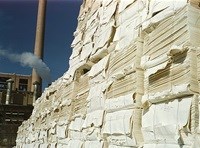Paper and pulp group Sappi predicts "substantially better" annual earnings as it battles currency volatility and high costs.
Third-quarter results
Reporting third-quarter results to June 2015, the company said on Friday it expected earnings per share (EPS) excluding special items for the full year to be substantially better than that of the prior year, due to lower interest costs.
"We expect that the regional operating performance for the year will be broadly similar to 2014 despite a number of significant once-off impacts from various capital projects," Sappi said.
At current exchange rates, the translation of euro and rand results to dollar, would adversely impact the group results, it warned.
For the third quarter to June 2015, Sappi said EPS excluding special items stood at 2 US cents, unchanged from the similar performance in 2014. Over the same period, profit EBITDA excluding special items fell to $109 million from $140 million, with sales sliding to $1.27 billion from R1.48 billion. Net debt dropped to $1.91 billion from $2.28 billion.
The third-quarter results are seasonally the weakest for Sappi.
Mill upgrades and a stronger dollar
In addition, the pulp mill upgrade at Gratkorn and planned annual maintenance shuts in all three regions reduced profit by about $27 million when compared to the equivalent quarter last year.
Furthermore, the North American business experienced significant pressure as a result of the stronger dollar, which led to increased imports of coated paper and reduced competitiveness in the export market. Sappi said its specialised cellulose business continued to generate solid returns during the quarter.
The planned annual maintenance shuts at Saiccor and Ngodwana reduced margins relative to the prior quarter. The dollar prices for dissolving wood pulp remained constant compared to the prior quarter, though the South African mills benefited from a weakening rand-dollar exchange rate.
The performance of the European business was adversely impacted by the higher cost of raw materials due to the stronger US dollar and additional pulp purchases during the upgrade of the recovery boiler at Gratkorn.
In the South African paper business, the virgin fibre packaging grades continued to show good demand growth. However, newsprint and recycled packaging paper demand was flat.
Source: INET BFA










































